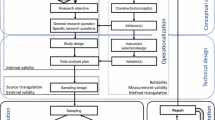Abstract
As a result of a student initiative, an annual interdisciplinary hackathon was established at the Cooperative State University Stuttgart (DHBW Stuttgart). This has shown how this new innovative format can be used to develop solutions to problems related to the UN’s 17 Sustainable Development Goals (SDGs). By bringing together students from a wide range of disciplines, digital solutions are created in a short period of time that deliver added value for all stakeholders. In addition, the transfer of theory and practice is combined, so that students can apply what they have learned to practical, real and relevant problems from a wide range of areas. Furthermore they get the opportunity to follow up on the ideas with the partners. Comprehensive evaluation criteria that take into account the interdisciplinary background of the students ensures comparability and promote the exchange of students among themselves and the fields of study, is promoted. A hackathon can therefore make a teaching-integrated contribution to innovation and curriculum on many levels.
Access this chapter
Tax calculation will be finalised at checkout
Purchases are for personal use only
Similar content being viewed by others
References
Briscoe, G., Mulligan, C.: Digital Innovation: The Hackathon Phenomenon. Core, London (2014)
Duale Hochschule Baden-Württemberg Stuttgart: https://www.dhbw-stuttgart.de/artikel/von-studis-fuer-studis-der-mesh-innovation-summit (2021) Accessed 28 May 2022
Kapur, R.: Significance of Digital Technology (2018)
Kolb, D.A.: Experiential Learning: Experience as the Source of Learning and Development. Prentice-Hall P T R, Englewood Cliffs, New Jersey (1984)
Lawrence, A.: What is a hackathon? a newbie’s guide to collaborative coding. https://www.rasmussen.edu/degrees/technology/blog/what-is-a-hackathon, Accessed 26 June 2022
MESH e.V.: Distribution of the study programs of the participants (2022)
MESH e.V.: Evaluation structure of the mesh hackathon (2022)
MESH e.V.: Internal survey of participants and organizers (2022)
Nancarrow, S.A., Booth, A., Ariss, S., Smith, T., Enderby, P., Roots, A.: Ten principles of good interdisciplinary team work. Hum. Resour. Health 11(1), 19 (2013). https://doi.org/10.1186/1478-4491-11-19
Starov, O., Kharchenko, V., Sklyar, V., Phillips, C.: Hacking the innovations with university-industry hackathons. Berlin, University-Industry Interaction Conference (2015)
Ulfsnes, R., Stray, V., Moe, N.B., Šmite, D.: Innovation in large-scale agile - benefits and challenges of hackathons when hacking from home. In: Gregory, P., Kruchten, P. (eds.) Agile Processes in Software Engineering and Extreme Programming - Workshops, pp. 23–32. Springer International Publishing, Cham (2021)
Yin, R.K.: Case Study Research: Design and Methods (Applied Social Research Methods). Sage Publications, fourth edition. edn. (2008)
Yong, M.: Why not just do all hackathons online? A comparative study between online and in-person events, Pittsburgh (2021)
Author information
Authors and Affiliations
Corresponding author
Editor information
Editors and Affiliations
Rights and permissions
Copyright information
© 2023 The Author(s), under exclusive license to Springer Nature Switzerland AG
About this paper
Cite this paper
Beigel, D., Blaurock, I., Sauter, V. (2023). How Interdisciplinary Hackathons Foster the Linking of Teaching and Practice. In: Auer, M.E., Pachatz, W., Rüütmann, T. (eds) Learning in the Age of Digital and Green Transition. ICL 2022. Lecture Notes in Networks and Systems, vol 634. Springer, Cham. https://doi.org/10.1007/978-3-031-26190-9_30
Download citation
DOI: https://doi.org/10.1007/978-3-031-26190-9_30
Published:
Publisher Name: Springer, Cham
Print ISBN: 978-3-031-26189-3
Online ISBN: 978-3-031-26190-9
eBook Packages: Intelligent Technologies and RoboticsIntelligent Technologies and Robotics (R0)




